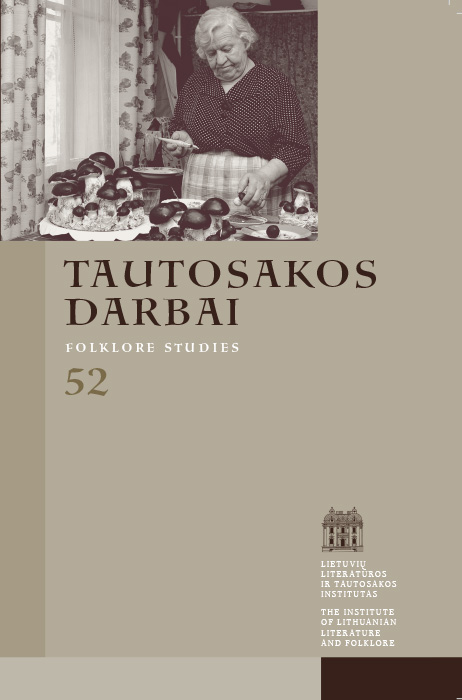Mythical Notion of Mushrooms in Lithuanian Culture
Abstract
According to the founders of ethnomycology Valentina and Gordon Wasson, it is possible to discern the mycophobic and mycophilic countries. Lithuania belongs to the mycophilic ones along with Russia, which these researchers have investigated (see Wasson and Wasson 1957: 4). In these countries, mushrooms and mushroom picking are important both economically and culturally.
The article focuses on the mythical notion of mushrooms in Lithuanian culture and employs the mythical explanations of the origins of mushrooms, the perception of mushrooms as mythical beings, the mythical level and the ritual aspects of the mushroom picking to elucidate it.
It is possible to discern two main reasons for mythologizing of mushrooms. First, they are important practically, therefore can acquire cultural meanings. Second, mushrooms are peculiar organisms, occupying the intermediate spot between plants and animals, and therefore characterized by certain mysteriousness.
There are two mythical explanations for the origins of mushrooms. According to the first one, mushrooms are chthonic organisms, embodying fertility of the earth (mushrooms as flowers of the earth) and close to the Lithuanian devil and his mythical associates: fairies, sprites. By employing also the dream-readings and other connections of the devil with death and hidden treasures, or money, it is possible to discern several mythical complexes comprising associations between mushrooms and the devil as mythical being in the Lithuanian worldview, namely, mushrooms – earth – the devil; mushrooms – death – the devil; mushrooms – money – the devil. The second mythical explanation of the mushrooms’ origins appears in the etiological legends depicting mushrooms as the God’s gift to the poor people that emerged from the grain or bread spit out by the God or St Peter. This parallel between mushrooms and bread is important to the mythical thinking as well as to the use of mushrooms for nutrition.
It is possible to identify mushrooms with mythical beings and people. This aspect is clearly visible in the Lithuanian riddles, according to which mushrooms have human body parts (feet, head), items of dress (hat, pants), or human denominations (uncle, girl). Besides, just like humans or animals, mushrooms allegedly suffer from the evil eye. According to the popular belief, well known across the whole of Lithuania, the sighted mushroom stops growing. The segregation of mushrooms into male and female genders is also important. This is especially vivid in the Lithuanian folksongs depicting war or wedding of the mushrooms.
There are beliefs of the mushrooms behaving as agile, sensitive beings or as peculiar forest spirits. They can hear the approaching mushroom pickers and hide from them. According to some Lithuanian legends and the comparative Slavic material, it is possible to assume that boletus (Boletus edulis) – considered the “proper” mushroom in the southeastern Lithuania – could personify the guardian spirit of the forest – the master of the forest. The mushroom picking also has connections with the mythical notion of mushrooms. This activity depends on the mythical principle of the mushroom fortune as the most important one.
The mushroom fortune manifests in successful picking, or mushrooms are the embodiment of success. This principle defines the amount of mushrooms that one is able to pick in the forest and the number and kind of mushrooms belonging to each individual picker. The mushroom fortune also involves having and carefully hiding one’s own picking places. The pickers may transfer the knowledge of these places to somebody else only as an inheritance. Mushroom picking may involve certain ritual practices: uttering of special prayers or performing peculiar magic actions aimed at securing the successful picking (throwing of shoes at the leaving mushroom picker, spitting on the first spotted mushroom, and occasional cases of offering).
The mythical notion of mushrooms is rather similar in the mycophilic cultures. Numerous mushroom-related Lithuanian legends and beliefs have parallels in the neighboring Slavic countries (Belarus, Russia, and Ukraine). In turn, the ethnographic data from these countries fills in some blank spots in the mythical notion of mushrooms in the Lithuanian culture. In Lithuania, the mushroom picking is not only a means of enriching the food provisions or securing some income. This is a meaningful phenomenon accompanied by ritual and magical actions and representing the traditional Lithuanian mythical worldview.
Downloads
Most read articles in this journal
- Vita Džekčioriūtė-Medeišienė, Mythical Notion of the Children’s Diseases and Their Liminal Expression in the Traditional Lithuanian Worldview , Tautosakos darbai: Vol. 64 (2022)
- Vita Džekčioriūtė-Medeišienė, Children’s Tales in the Traditional Lithuanian Culture: Purpose of Cruel Elements , Tautosakos darbai: Vol. 62 (2021)
- Rūta Žarskienė, Inga Vidugirytė, Asta Skujytė-Razmienė, Gražina Kadžytė, Lina Leparskienė, Vita Džekčioriūtė-Medeišienė, Dalia Zaikauskienė, Chronicle , Tautosakos darbai: Vol. 58 (2019)
- Austė Nakienė, Daiva Vaitkevičienė, Vita Džekčioriūtė-Medeišienė, Gražina Kadžytė, Aurimas Bačiulis, Vida Savoniakaitė, Lina Būgienė, Chronicle , Tautosakos darbai: Vol. 55 (2018)
- Austė Nakienė, Beata Baublinksienė, Aušra Žičkienė, Audronė Gedžiūtė, Vita Džekčioriūtė-Medeišienė, Chronicle , Tautosakos darbai: Vol. 60 (2020)
- Vita Džekčioriūtė-Medeišienė, Scaring of Children in the Traditional Lithuanian Worldview , Tautosakos darbai: Vol. 51 (2016)
- Jurga Sadauskienė, Austė Nakienė, Rytis Ambrazevičius, Asta Skujytė-Razmienė, Radvilė Racėnaitė, Gražina Kadžytė, Modesta Liugaitė-Černiauskienė, Vita Džekčioriūtė-Medeišienė, Eligija Garšvienė, Chronicle , Tautosakos darbai: Vol. 54 (2017)
- Jūratė Šlekonytė, Asta Skujytė-Razmienė, Gražina Kadžytė, Austė Nakienė, Vita Džekčioriūtė-Medeišienė, Chronicle , Tautosakos darbai: Vol. 56 (2018)




